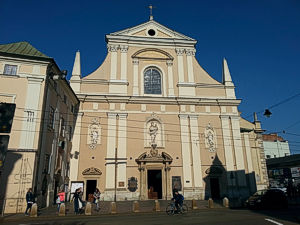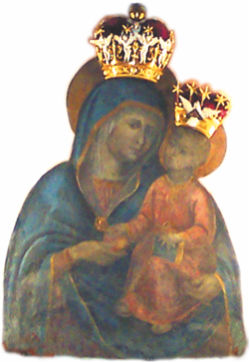|

Krakow’s Carmelite Church
of Piasek
Since 1397 the Carmelite church
in the Piasek neighborhood has been one of the most
prominent shrines of Krakow. The church, dedicated to the
Visitation of the Blessed Virgin Mary, is fairly centrally
situated just one block from the Old Town historic district.
Spiritually, its status as a hallowed place has been largely
enhanced thanks to the veneration of the image of Our Lady
of Piasek which adorns one of the walls.
 Pilgrim's guide to Krakow
Pilgrim's guide to Krakow
History of Krakow’s Carmelite
church.
According to tradition, Duke
Wladyslaw I Herman, who ruled Poland from 1079 to 1102,
founded the church in the Piasek neighborhood of Krakow in
1087. In Polish, “piasek” means “sand” and the sand from the
place where the church of the Carmelite church now stands
allegedly cured the Polish monarch of severe facial
carbuncles. He had a dream in which the Blessed Virgin Mary
instructed him to find sweet-smelling violets and apply sand
from under them to his face. The grateful duke founded a
church on the site but its construction was abandoned after
his death.
According to documents, in 1395
the royal couple of Queen Jadwiga and King Wladyslaw II
Jagiello founded the Gothic church of the Visitation of the
Blessed Virgin Mary. In 1397 the first Carmelite friars
arrived to take care of the church and live in the adjoining
monastery. The church and monastery stood outside the
medieval city of Krakow, some 200 meters from its
fortifications. This doomed them to devastation on several
occasions when the city was besieged.
The present church of the
Visitation of the Blessed Virgin Mary dates from 1679 and is
a baroque basilica with the front elevation modelled on the
architecture of the Church of the Gesu (Chiesa del Gesu)
in Rome. An outside alcove by the southern wall of the
church, next to the Chapel of Our Lady of Piasek, holds a
Calvary scene consisting of three sculptures of the 18th
century showing Jesus Christ on the Cross and two crucified
thieves against a background of Jerusalem painted in 1937. A
low cornerstone of the Chapel of Our Lady of Piasek, secured
with a metal mesh, bears a barely visible indentation in the
stone allegedly being a footprint of Saint Queen Jadwiga.
Inside, a monumental high altar
of 1700 covers the entire back wall. Its central scene
depicts the Blessed Virgin Mary visiting Saint Elizabeth.
Pope John Paul II has granted
the title of a minor basilica to Krakow’s church of the
Visitation of the Blessed Virgin Mary in 1997.

Sanctuary of Our Lady of Piasek
in Krakow
The present chapel of Our Lady of Piasek, designed by royal
architect Giovanni Trevano, was erected in the years 1637 to
1641 next to the southern wall of the church of the
Visitation of the Blessed Virgin Mary. The solemn baroque
structure is topped with a gold-plated statue of Our Lady
with the baby Jesus of 1678.
The pious citizens of Krakow have always considered Our Lady
of Piasek (Matka Boza Piaskowa) in the Basilica of
the Visitation of the Blessed Virgin Mary to be the most
reliable protectress of their city. The Madonna they have
venerated at the Carmelite church in the Piasek neighborhood
and often called Our Lady of Krakow, painted on the church
wall by an anonymous artists, dates from circa 1500.
Tradition has it that angels completed the picture overnight
when its painter had gone to sleep and soon a strong light
emanating from the painting and angelic music woke up monks
and other people who lived nearby.
The miraculous image of Our Lady of Piasek depicts the
Blessed Virgin Mary with the baby Jesus as the Mother
presents her Child with an apple. They are flanked by two
angels playing violin, who are barely discernible, faded and
obscured by the frame of the altar. Originally, the painting
adorned the outer wall of the church, next to its side
entrance, and was visible from the outside. Since 1641 the
picture has been enshrined inside a baroque chapel, added to
the church, which replaced an earlier modest Gothic
structure from the 16th century.
Evidently from the outset the image the Madonna of Piasek
has become renowned for mercies obtained through the
intercession of the Blessed Virgin Mary. Also Poland’s king
Jan III Sobieski (John III) maintained that his victory over
the Ottoman Empire in the Battle of Vienna was attained
through the prayers in Krakow’s Sanctuary of Our Lady of
Piasek.
The image of Our Lady of Piasek has been canonically crowned
with papal crowns in 1883.
Other points of interest in
Krakow’s Carmelite church
Another side chapel of the basilica is dedicated to Our Lady
of the Scapular. It dates back to 1645 and was rebuilt in
1779. The chapel was erected as the symbolic seat of
Krakow’s once immensely popular Archfraternity of the Holy
Scapular, a devotional association embracing the poor as
well as the rich, men and women, started in the 16th
century. The chapel’s high altar of the mid-19th century
holds the picture of Our Lady of the Scapular of 1761.
The architecture of a large monastery adjoining the
Carmelite church of Piasek mostly dates from the late 17th
century. The ground floor of its great cloister is
accessible through the gate at Karmelicka street from 8 am
to half past noon and from 2 pm to 5.30 pm September through
June, and 8 am to noon as well as 3 pm to 5.30 in July and
August. Barrel vaults of the cloister are decorated with the
18th-century frescos which depict the story of the Carmelite
church in Krakow and its Sanctuary of Our Lady of Piasek.
The cloister’s intricately carved, gilded baroque altar of
circa 1700 contains the picture of Madonna, though often
covered with a painting depicting Blessed Francus of
Francavilla. A grand staircase leads to two upstairs stories
of the cloister.
Visitor information for the
Carmelite church in Krakow
The Carmelite church and monastery stand on the corner of
Karmelicka street and Garbarska street, their facades facing
the former. They are situated within easy walking distance
of the Old Town historic district of Krakow: just 500 meters
northwest from the city’s Rynek Glowny central square, down
Szewska and Karmelicka streets.
The Holy Mass is celebrated in the Basilica of the
Visitation of the Blessed Virgin Mary (Bazylika
Nawiedzenia Najswietszej Marii Panny) at 6 am, 6.30 am
(except July and August), 7 am, 7.30 am (except July and
August), 8 am, 9 am, noon, 4.30 pm, and 7 pm on weekdays and
Saturdays, and at 6 am (except Christmas), 7 am (except
Easter), 8 am, 9 am, 10 am, 11 am (for children), noon, 1
pm, 4.30 pm, and 7 pm (for the youth) on Sundays and
principal feast days.
|
Pilgrimage
sites in Krakow
In the footsteps of Pope John Paul II
Krakow, Poland
Historic
churches in Krakow
Poland’s second holiest shrine at the site of St.
Stanislav’s 1079 martyrdom. Splendid Baroque church and fine
monastery modeled on a Renaissance castle.
Hilltop monastery-fortress dates from the 11th century.
Magnificent 17th-century Baroque hermitage complex atop
the Silver Mountain hovers over Krakow.
Vast fortified complex on the Vistula river is home to
Krakow’s once powerful Premonstratensian Sisters since the 12th
century.
|





